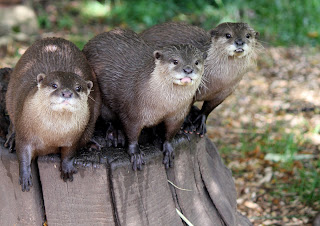"Don't hedge your prose with little timidities. Good writing is lean and confident...Every little qualifier whittles away some fraction of the reader's trust. Readers want a writer who believes in himself and in what he is saying. Don't diminish that belief. Don't be kind of bold. Be bold."--William Zinsser
Sucking leeches. Weasel words. Wishy-washy. Weakling. Flabby. Ooh, fightin' words, yes?
Not when it comes to the writer's world.
While such terms would be insults when speaking about a person, they characterize an important writing principle when applied to qualifiers, those words that "limit or modify the meaning of another word, changing how absolute, certain or generalized it is" (source).
William Strunk of Elements of Style fame makes the point vividly clear: "Avoid the use of qualifiers. Rather, very, little, pretty--these are the leeches that infest the pond of prose, sucking the blood of words. The constant use of the adjective little (except to indicate size) is particularly debilitating..."
Judy Delton, in The Most Common Writing Mistakes (And How to Avoid Them) explains: "A qualifier is something that takes a perfectly clear, decisive statement and weakens it. It is a wishy-washy word that drains strong statements of their validity. Qualifiers are words like just, even, like, although, also, besides, almost, maybe, if, but, too, unless, sort of....These weaklings qualify things so that a writer or speaker never has to take a stand, never has to make a decision. He can eat his cake and have it too, pleasing both sides. A new writer who is afraid of risks (anyway) finds them convenient and satisfying (sort of)."
Again, this time from the Writing Center, "Qualifiers and intensifiers are words or phrases that are added to another to modify its meaning, either by limiting it ('he was somewhat busy") or by enhancing it ("the dog was very cute")...Excessive use of qualifiers can make you sound unsure of your facts...writing that contains too many qualifiers can sound unclear and wordy."
Bryan Garner, author of Garner's Modern American Usage, calls the qualifying word "very" a weasel word..."(it) functions as both an adjective and an adverb, surfaces repeatedly in flabby writing. In almost every context in which it appears, its omission would result in at most a negligible loss. And in many contexts the idea would be more powerfully expressed without it."
I find the term "weasel word" particularly descriptive. Turns out it's not new to a writer's vocabulary. According to Wikipedia, the expression derives from the egg-eating habits of weasels. "An egg that a weasel has sucked will look intact to the casual observer, while actually being empty. Similarly, words or claims that turn out to be empty upon analysis are known as 'weasel words.' The expression first appeared in Stewart Chaplin's short story 'Stained Glass Political Platform' (The Century Magazine, 1900), in which they were referred to as 'words that suck the life out of the words next to them, just as weasel sucks the egg and leaves the shell." (More on weasel words here.)
It took me some time to understand how qualifiers negatively affect the impact of writing. But with edits, I've identified my worst culprits: seems, just, about, almost, all.
Ever done a "find" search to see how many qualifiers* you use? If you're like me, you're tired of the wishy-washy, weak words, and don't want your characters to be that way either. I'm all for pulling out those suckers, wrestling the weasels down, and shooting for more vibrant, powerful language. How about you?
*The most common qualifiers according to About.com: very, quite, rather, somewhat, more, most, less, least, too, so, just, enough, indeed, still, almost, fairly, really, pretty, even, a bit, a little, a (whole) lot, a good deal, a great deal, kind of, sort of.
(photo: sxc.hu)
___________________

I use them all, except 'very,' and when I run a search, I discover I can eliminate hundreds of words. Maybe thousands. I frequently talk like that, too, depending on the situation. If I'm at work and need to be to the point, I'm fine. If I'm with family or friends, and I want to be especially self-deprecating, my mouth is full of those weak little words. I'd never seen a picture of a weasel. They are cute. (And then I was going to write "sort of.")
ReplyDeleteThis is a great post. Yes, I do "finds" all the time and come up with far too many examples of weasel words (love the etymology on that, by the way). My worst is probably "seems," which I'll often use in an attempt to avoid "is" or "was." So - thanks for the reminder. Time to do another "find" today!
ReplyDeletePeggy
Cathy--you brought up something I recognize in myself, too, talking like that. Yeesh. Is there a word finder for our speech patterns, too?!
ReplyDeletePeggy-I love that I stumbled on the origin of "weasel words." It's quite a word picture, isn't it? Thanks for dropping by. Always like hearing from you :-) Hope your writing's going well...
You know how it is, some days better than others.
DeleteI wanted to tell you I called my friend today and told her about "weasel words." She teaches a course on word origins. She loved it!
Oh, that's good news. Now more word lovers will know about weasel words! Thanks for passing it on...
DeleteGreat post, Kenda! This is something I try to convey to my teen writing students, and something I bear in mind for my writing too. Always working to get better! Thanks for sharing this. :)
ReplyDelete